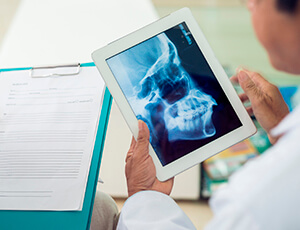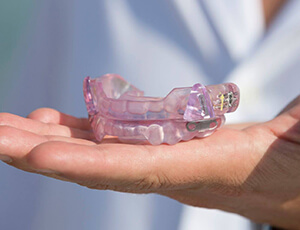TMJ / TMD Therapy
Stiff Jaw? Chronic Headaches?
Does your jaw painfully pop and click all the time? Does it ever get stuck? Do you get migraines frequently and can’t figure out why? All of these symptoms (and more) can actually stem from a strained or over-active temporomandibular joint (TMJ), which is the set of hinges on your jaw that connects it to your head. Problems with this joint are referred to as temporomandibular joint disorders (TMD), and they can cause a wide variety of dental and overall health problems. Dr. Gary Klein and our team are trained to handle these kinds of issues, so we’ll always keep an eye on the condition of your jaw whenever you come to see us.
Diagnosis & Treatment
 As part of your regular checkup, we will make sure everything is alright with your TMJ. We’ll look at your range of motion, ask about any discomfort, and also test your occlusion (how your teeth come together). Any of these tests can reveal the signs of strain or misalignment, and depending on what we find, we can recommend the right kind of treatment. For some, the answer is as simple as reducing daily stress or performing a few quick stretches, but for others, a specialized mouthpiece called an occlusal splint may be needed.
As part of your regular checkup, we will make sure everything is alright with your TMJ. We’ll look at your range of motion, ask about any discomfort, and also test your occlusion (how your teeth come together). Any of these tests can reveal the signs of strain or misalignment, and depending on what we find, we can recommend the right kind of treatment. For some, the answer is as simple as reducing daily stress or performing a few quick stretches, but for others, a specialized mouthpiece called an occlusal splint may be needed.
Occlusal Splints
 This is a small, custom-made mouthguard that you would only wear to bed at night. It slightly repositions your jaw so that the muscles can relax, heal, and naturally find a more comfortable position. Since TMJ problems commonly lead to nocturnal teeth grinding as well, it will also provide a protective barrier between them. Since the splint will be made just for you, it will be completely comfortable in addition to being extremely effective at relieving your pain.
This is a small, custom-made mouthguard that you would only wear to bed at night. It slightly repositions your jaw so that the muscles can relax, heal, and naturally find a more comfortable position. Since TMJ problems commonly lead to nocturnal teeth grinding as well, it will also provide a protective barrier between them. Since the splint will be made just for you, it will be completely comfortable in addition to being extremely effective at relieving your pain.
TMJ Treatment FAQs
 Do you have questions about TMJ treatment in Sunnyvale? Our friendly team at Klein Family Dentistry is here to help you get the answers you need. Below, we’ve collected some of the most common questions we get from our patients along with our answers. If you don’t see what you’re looking for, please don’t hesitate to call our office directly.
Do you have questions about TMJ treatment in Sunnyvale? Our friendly team at Klein Family Dentistry is here to help you get the answers you need. Below, we’ve collected some of the most common questions we get from our patients along with our answers. If you don’t see what you’re looking for, please don’t hesitate to call our office directly.
Can TMD be permanently cured?
While the discomfort and certain side-effects associated with TMD can sometimes go away over time, depending on several factors, like the severity of your condition and underlying cause, it’s still a good idea to be diligent about staying on top of your treatment to keep the effects from resurfacing. Occlusal splints are specifically designed to gradually shift your jaw into its ideal position to bring you lasting relief. However, stop using it too soon and you could find that symptoms return.
Are occlusal splints uncomfortable?
When it comes to any oral appliance, whether it’s a mouthguard or occlusal splint, it’s going to feel unnatural in the mouth. Because occlusal splints work to gradually shift the jaw over time, it will become more comfortable as your jaw alignment eases into its ideal position. Despite feeling a little cumbersome or awkward, your splint should never be painful to wear. If this is the case, bring it back to your dentist in Sunnyvale to be adjusted.
How long does it take for an occlusal splint to work?
If you have an occlusal splint, you’ll need to wear it every night while you’re sleeping. This treatment is designed to gradually ease pain associated with TMD over time, so you won’t notice the effects of your condition disappear all at once. Typically, after about six weeks, patients are able to notice improvements, but they may not experience full relief at this point. Around three to six months of using your occlusal splint, TMD symptoms and discomfort are typically resolved. However, this timeline really depends on how diligent you are about wearing the occlusal splint and the severity of your condition.
Can TMD be treated without surgery?
Yes! The National Institutes of Health recommends using conservative treatment methods to address TMJ pain before resulting to surgery. In many cases, less invasive therapy options like occlusal splints are able to address the issue without a life-altering jaw surgery that requires extensive recovery. In most cases, surgery to address TMD is only recommend as a last resort.
